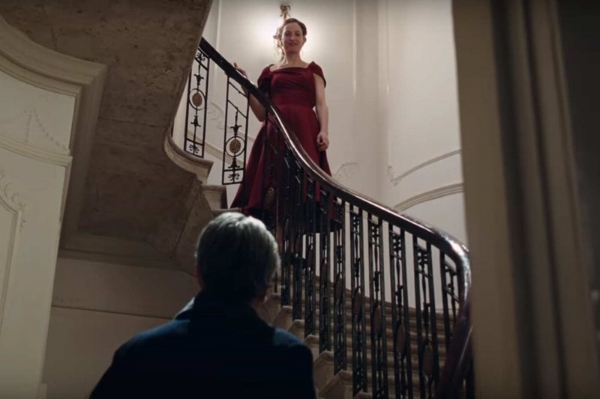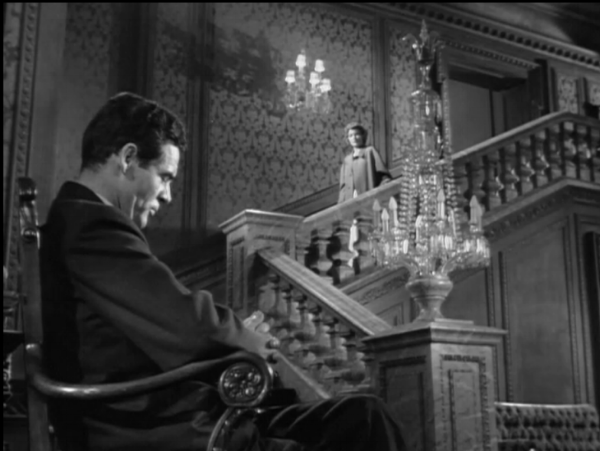READ ME is a platform for female-led writing on film hosted by Girls on Tops. Louisa Maycock (@louisamaycock) is Commissioning Editor and Ella Kemp (@efekemp) is Contributing Editor.
What does a 1949 film noir have in common with Paul Thomas Anderson’s eighth feature? Manuela Lazic explores the intricacies of powerful men and the women who love them through gaslighting and fairytales in Caught and Phantom Thread.
Early on in Max Ophüls’s 1949 film noir Caught, young department store model Leonora Eames (Barbara Bel Geddes) finds herself going for a fast-paced ride at night with millionaire Smith Ohlrig (Robert Ryan). Smith doesn’t bother telling his new acquaintance where they are going. He found Leonora as she was waiting for a taxi to the boat party he organised, and was running away from. Smith drives fast, and he likes it – “I’m a good driver,” he declares coolly. With the same confidence, he informs Leonora that he intends to remain a bachelor forever. Soon, the car stops. When Leonora asks where they are with a little fear in her voice, Smith replies, cigarette hanging from his smug mouth, “At the house, my house.” When Smith adds, “Don’t be so ignorant, you knew you weren’t just taking a drive”, Leonora can’t help but smile – the wealthy, handsome, dark and deep (he hates Los Angeles parties, just like she does!) man knows exactly what he’s doing. She’s grateful for his attention, and his mastery over the situation. He knows she wants a man like him, even if she had, in the moment, forgotten it.
Smith seems cocky and selfish, but in movies, especially the glossy and sexy film noirs of Hollywood’s 1940s and 1950s, it’s precisely those qualities that define the wounded, and therefore tragically irresistible, men. And since Leonora eventually accepts to follow Smith into his mansion, who are we to question his character? How many times have you silenced your doubts about your friend’s partner because this enamoured friend believed in her love story too much? Perhaps even you wanted to believe in it too.
Smith Ohlrig shares many traits with Reynolds Woodcock (Daniel Day-Lewis), and the “it all happened so fast” meet-cute of Caught clearly inspired Paul Thomas Anderson’s Phantom Thread. Like Smith, Reynolds isn’t interested in matrimony (“I’m a confirmed bachelor”), drives like a madman and wastes no time asking for what he wants from the young Alma (Vicky Krieps), or from anyone else for that matter. Alma, too, has shades of Leonora: she becomes a model for Reynolds, and appreciates being his muse as a sign of his love. Reynolds is a handsome man who makes her feel beautiful and has “made [her] dreams come true”. From their origins as lower-class outsiders (Alma is an immigrant of undisclosed origins; Leonora is from Denver), both women become wealthy, well-dressed trophy wives to impressive and elegant men.
Ophüls understands the dreams of Prince Charming that motivate Leonora to move West and enrol in a charm school, but unlike most male filmmakers, he doesn’t paint them as ridiculous or simple: he recognises that fairytales, because they are at once unbelievable and irresistible, constitute the deepest, most insidious form of gaslighting. This term, coming from the 1940 noir film Gaslight in which a woman is manipulated by her new husband into thinking she has gone mad, refers to the psychological manipulation that makes someone doubt their own experience and perception – which is what fairytales, with the push and pull of their unlikeliness and appeal, precisely do. Early on in Caught, Leonora muses to her roommate about what would happen if one day, a wealthy and beautiful man walked into her store, saw her face and found it to be the one he had always dreamed of. This is, of course, just a fantasy, but then it does happen as Smith offers her a magical life on a silver platter. Or does it? Could it be that the reason why the Cinderella myth is always so compelling isn’t its impossibility, but its plausibility? Do we believe in fairytales precisely because of their improbability? If something wonderful happens to you, why would you dare have reservations about it? Could the fact that Smith’s proposition came out of nowhere be the best reason for Leonora to accept it?
Alma too buys into the idea that perhaps, she deserves a magical life after all. Their financial circumstances, compounded by their mutual condition as women in a patriarchal society, have programmed both Leonora and Alma to repress their doubts and reason in the company of a Charming Prince. Because he is the exception to the rule of their persecution – because he is one in a million – Prince Charming is, by definition, impossible to resist. Ophüls and Anderson both understand that women who fall for such men are not (always) superficial or never thinking ahead: on the contrary, they have so little belief in the extravagance of fairytales that when one is presented to them, they want to try it on. They have to make it real, because they want to believe that even in an unfair society, they can be – they deserve to be – happy, after all. But we know that this is really how fairytales work and how they mess up women’s lives: you are not supposed to believe those stories until they stop you in your tracks and dare you to turn them down. And who is above believing in such happiness?
There would be nothing wrong with fairytales if not only the meet-cute came true, but the happy ending too – if the Prince and his Princess did indeed live happily ever after. What Caught and Phantom Thread make clear is that such endings don’t exist, because the fairytales girls are told are based on one gigantic lie: that men as flamboyant as Smith Ohlrig or Reynolds Woodcock could ever be as grateful for their wives as their wives are for them. Boys, unlike girls, are not told fairytales about finding the one perfect companion that will give meaning to their lives. Instead, they are fed stories about solitary triumph, one-man heroism saving the world, or the nation, or his family, and always himself, from the unfriendly jungle that is the universe. Even if he may not be the hero we need right now, he is nevertheless the one we deserve: a lone individual who will be bad for the greater good, his sacrifice of morality or plain humanity actually helping the world move forward. When a princess falls into his arms, the prince sees her as another opportunity to rule – another person to place under his thumb, and one who might like being there too.
Caught being an excellent example of the film noir genre, and Phantom Thread evidently following in that tradition, the characters in both films struggle to step outside themselves and reflect on the psychological reasons behind their often dramatic actions. As surely as their conquests have been mesmerized by submissive fairytales, neither Reynolds nor Smith are self-aware enough to realise that they have been fed these tales of male heroism by patriarchal society all their lives: they have suffered their own form of gaslighting. Furthermore, they cannot see that each decision they make is the result of their own sense of inadequacy towards this myth. When Smith marries Leonora, it is literally because his shrink told him that his arrogance – and thus his insecurity – would never allow him to share his life with anyone. Smith, however, doesn’t realise that this brusque decision (typical of the high emotional drama of the film noir) only proves the doctor’s point. It isn’t courage that makes him ask for Leonora’s hand, but the fear of not being a real man. Reynolds, meanwhile, takes Alma under his wing because his previous girl started to get annoyed by his refusal of intimacy. When he finds himself overcome with guilt and restlessness because of Alma, he runs to his sister Cyril (Lesley Manville) to complain, rather than ask for her opinion. Rather than analyze his own disdainful attitude towards Alma, he accuses her of being disruptive.
Neither Smith nor Reynolds understand that it is their fearful and obsessive-compulsive routine, sealed off from the outside world by their wealth and arrogance, that is the source of their relationship problems. Leonora and Alma simply reignite the fears and doubts that their partners have buried under their claims to exceptionalism, independence, and an omniscient understanding of the world. These princesses, hoping for considerate and generous men, found instead two scared and withdrawn pseudo-heroes hanging on to their dreams of strength and autonomy. Fairytales and male fantasies don’t marry well.
Both films offer resolutions for their spurned women, although very different ones. In her search for a more down-to-earth and honest existence, Leonora becomes secretary and soon girlfriend to Doctor Larry Quinada (James Mason), a charming and generous counterpoint to the selfish Smith. Leonora, however, struggles to let go of the dreams that have motivated her for so long, pushing her out of her small-town and into a charm school. The consequences of her relapse are catastrophic for Leonora – as they often are for women. She becomes pregnant with Smith’s child, but more tragic and true to the female experience still, is the devouring guilt that ravages her. Even though she no longer has faith in the fairytale, she is still blinded by its gaslight: she blames herself for ever having believed it, then for causing Smith’s near-fatal heart attack by refusing to abide by his rules. Only once her shame has brought her to the hospital, after she has lost Smith’s child, can Leonora see that none of this was her fault, and embrace her freedom. Only after suffering the loss of a baby and the deceitful dreams that brought it into her, can Leonora start contemplating a fairer life with a truly generous, if not flamboyant, prince.
Alma, meanwhile, finds validation in the harm she can cause to Reynolds’ body and psyche. It is as though, rather than running to Larry after Smith’s heart attack, Leonora had rejoined her husband and decided to take care of him when he was “flat on [his] back, helpless, tender, open, with only [her] to help,” in order to briefly have him be the prince of her dreams, who needed his princess as much as she needed him. Alma refuses to let go of her fairytale: “and then I want you strong again,” she reassures (but it sounds like a threat) Reynolds. She has found a (dark, manipulative, messed up) way to make her own and Reynolds’ dreams come true: she is the princess, and he is the hero. Instead of letting the gaslight obscure her experience of reality, she lets it illuminate it, round off its corners, and make it look as exciting and too-good-to-be-true as she always wanted it to be
On the surface, Caught – a 70-year old movie – seems more realistic than the millennial gloss on noir tropes in Phantom Thread. But how many times have we wished for our friends to open their eyes and walk out of the toxic relationships they have enmeshed themselves in? Cinema can make you reflect on the sacrifices you are willing to make for your own happiness – either kill off the fantasy, or twist your life to make it fit the dream. In any case, as Caught and Phantom Thread make clear, for women to be the true heroes, they have to occupy the driver’s seat and take the wheel of their own destiny.
Manuela Lazic (@ManiLazic) is a freelance film critic based in London. She contributes regularly to The Ringer and Little White Lies, and she loves actors very much.




